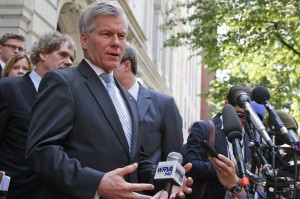Politics Is Not a Crime
< < Go Back
If Bob McDonnell is guilty of corruption, then so is Hillary Clinton.
Americans think most politicians are corrupt these days, but sometimes the law needs to protect the normal business of politics against prosecutors who invent law-breaking when it doesn’t exist. That’s the Supreme Court’s task on Wednesday when it hears the appeal of former Virginia Governor Bob McDonnell’s corruption conviction.
A jury convicted Mr. McDonnell in 2014 for taking more than $170,000 in gifts from a Richmond businessman who was also a family friend. The gifts included a $50,000 loan, $15,000 to finance their daughter’s wedding, fancy dresses, a Rolex watch and vacations. Let us stipulate that this is reckless and sleazy, and that the businessman hoped the Governor would take actions to promote his diet-supplement business.
The legal problem is that Mr. McDonnell never provided much of any quo for the quid. Virginia law lets politicians accept gifts, and prosecutors never charged him with violating state law. They charged him under federal law with performing “official acts” to benefit the business, but none of those acts influenced policy or changed a government decision.
Mr. McDonnell was convicted for attending a lunch at the executive mansion where the businessman’s company gave out grants to universities, for attending a reception with the businessman, for asking an aide about research pertaining to the company, and for arranging a meeting with his staff and the man.
This stretches the bribery statutes to criminalize the normal transactions of politics. Public officials routinely act as boosters for local businesses. They also frequently meet donors and introduce them to others. Citizens also have the First Amendment right to petition their elected officials. If arranging a meeting for a benefactor qualifies as corruption, prosecutors will be able to target any politician in the country.
Such as Hillary Clinton. As Secretary of State Mrs. Clinton lobbied governments on issues affecting companies that donated to the Clinton Foundation. Then there are the speaking fees for Bill Clinton paid by companies that had interests before the State Department.
In 2010 the Supreme Court grappled with a similar corruption issue in Skilling v U.S., a case about former Enron CEO Jeffrey Skilling. The case was decided unanimously and a 6-3 majority defined corruption under the Honest Services Fraud statute as bribes and kickbacks. In a concurrence written by the late Justice Antonin Scalia, three Justices would have struck down the honest-services law.
“A criminal statute must clearly define the conduct it proscribes,” Justice Scalia wrote. The Honest Services Fraud statute that prohibits “a scheme or artifice to deprive another of the intangible right of honest services” is “vague, and therefore violates the Due Process Clause of the Fifth Amendment.”
More From The Wall Street Journal (subscription required):




